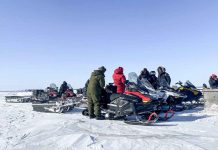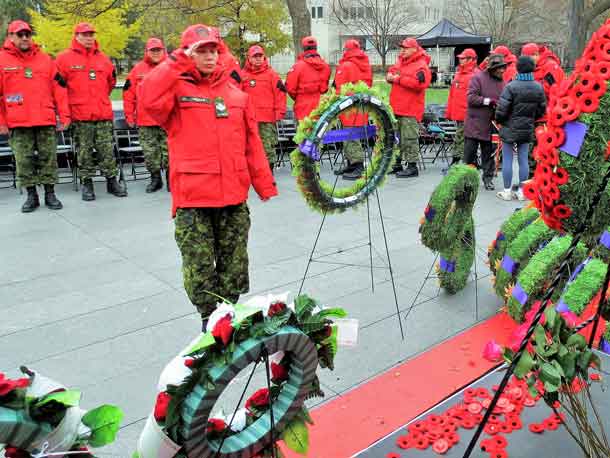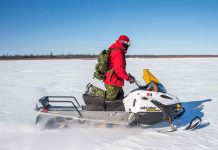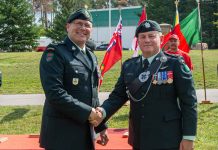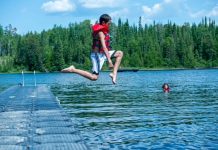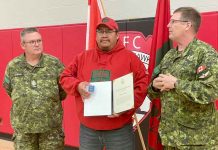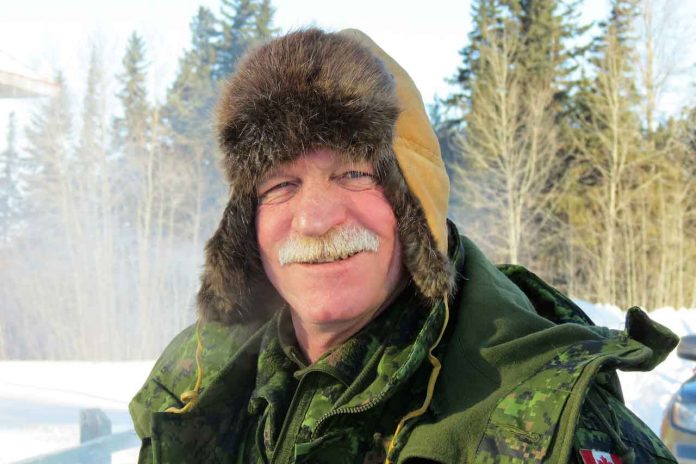
Robert (Rob) Patterson is a Canadian Army veteran with 38 years of military service that he has enjoyed immensely.
But ask him what has been the best part of those years and he will tell you it has been the last 16 years he has spent working with the Canadian Rangers in the Far North of Ontario. It is a job he is about to leave. But the good news is that he is being promoted to captain and moving to serve with the Canadian Rangers of Newfoundland and Labrador.
He is currently a chief warrant officer and the group sergeant major for the 3rd Canadian Ranger Patrol Group. From its headquarters at Canadian Forces Base Borden the group commands 600 Canadian Rangers, who are part-time army reservists, in 29 First Nations across the Far North of Ontario. His position takes him to all 29 First Nations and beyond in Northern Ontario.

“This has been one of the most fulfilling jobs that I’ve had in my entire life,” he says, “because the Rangers are actually doing real live things that help people. They help their communities and their people in more than one way. Just introducing search and rescue to those First Nations was absolutely phenomenal with the number of lives that they’ve saved in recent years.
“They’re doing everything from humanitarian work to flood and fire evacuations to search and rescue and all sorts of things. They don’t have the normal services up there that other parts of Ontario have. Their chiefs recognize the range of services the Rangers bring to their communities and their ability to respond in emergencies. Life in the Far North is hard and the world they live in is not understood by most people in the south.”
He said he continues to be amazed by the skills the Rangers bring to the army.
“They have taught me and other members of the army so much about how to survive in the harshest of conditions with a minimum of equipment and absolutely nothing around them for hundreds of kilometers. If something happens to you up there it can be dangerous and there’s no phoning 911.”
He said he will miss many of the Rangers. “I’m going to miss the relationships and friendships that I’ve established in their communities. I consider many of them to be my friends. They’ve taken care of me in their territories, in their communities, and on the land. When they come to Borden I’ve brought them to my house because otherwise they’d be stuck at Borden for a weekend by themselves. They can teach you so much when you talk with them and get to know them.”
He is continually impressed by the female Rangers. “We’ve almost a 50-50 ratio of female Rangers to male Rangers,” he said. “They do everything side by side, men and women. A lot of our female Rangers are far better in the bush than many of the males.”
He joined the army at 18 and served in the field artillery until he moved to the Rangers. In 2012-13 he served a tour in Sierra Leone, during the West African country’s recovery from a devastating civil war.
“I’ve loved the army,” he said, “but I could never go back to the regular army after the Rangers. I’ve loved being with them because you are never bored with them.”
His first job with the Rangers was working with Junior Canadian Rangers, an army program for boys and girls aged 12 to 18 in remote and isolated communities across the Canadian North. “It was a very rewarding experience working with the kids,” he said. “I was amazed by their familiarity with firearms, their ability to go on the land, and to operate boats.”
Two years ago he received a national award from the Canadian Safe Boating Council for his “incredibly special” work promoting safe and responsible boating in Indigenous communities.
“He was deployed for about 150 days a year in the North,” said Ted Rankine, the council’s manager of safety programs, “that’s more than half a working year, where he worked, trained, and educated others in some of Canada’s harshest environments.”
When Patterson became a sergeant major he used the position to continue promoting boat and water safety in Indigenous communities across Canada.
(Sergeant Peter Moon is the public affairs ranger for the 3rd Canadian Ranger Patrol Group at CFB Borden.)

